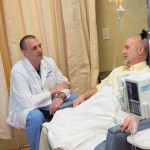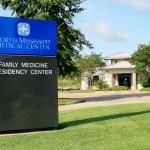
Mollie Ashe Scott, Pharm.D., BCACP, CPP, embarked on a highly effective letter-writing campaign to support provider status.
FOR MANY YEARS, I’ve been an active member of the North Carolina Association of Pharmacists and ASHP. But more recently, one issue in particular—provider status for pharmacists—has propelled me to put even more energy into the group and to dive into the arena of public policy. My reason is straightforward: I believe provider status is the most important issue facing the profession of pharmacy today.
In fact, that’s precisely what I wrote last March in a letter to Congressman Mark Meadows, who represents my state’s eleventh district. The letter, co-signed by the pharmacy student body at the Eshelman School’s Asheville branch campus, urged him to support H.R. 4190.
Doing My Part to Make Provider Status a Reality
If passed into law, H.R. 4190 would allow Medicare reimbursement for clinical pharmacy services in medically underserved areas. In rural areas of western North Carolina, many clinical pharmacists already work alongside physicians to provide clinical support and augment the care provided by an overburdened cadre of primary care physicians. The same scenario is playing out in communities across the country.
The possibility that pharmacists will earn provider status is perhaps the greatest opportunity for our profession since I began practicing nearly 20 years ago. But the lack of appropriate reimbursement is standing firmly in the way. So, I wanted to do my part to make provider status a reality.
As I wrote in the letter, “I have seen firsthand the need for enhanced clinical pharmacy services in our region…. Our ability to optimize medication therapies, identify drug related problems, and prevent devastating consequences of poorly controlled chronic conditions is well documented.
“Pharmacists, in collaboration with physicians and other healthcare professionals, can improve the health of the patients they serve, and decrease health care costs by preventing and expensive negative outcomes.”
That letter (which we sent to other members of the state’s congressional delegation in addition to Congressman Meadows) was only one part of what has become a concerted, statewide effort to reach out to our representatives in Congress and to others with influence on Capitol Hill.
The possibility that pharmacists will earn provider status is perhaps the greatest opportunity for our profession since I began practicing nearly 20 years ago.
In April, a second letter written by William J. Hitch, Pharm.D., BCPS, CPP, director of pharmacotherapy at the Mountain Area Health Education Center (MAHEC) and signed by pharmacists, physicians, and other healthcare professionals at MAHEC, and urging support for H.R. 4190 was sent to the North Carolina congressional delegation. This strategy made sense for us because one of MAHEC’s goals is ensuring that there are enough primary healthcare providers in North Carolina’s rural areas.
Persuading Other Colleagues to Get Involved
I also belong to an informal group of about 20 pharmacists who meet monthly. One of our goals was to win Congressman Meadows’ support for H.R. 4190. At the end of one meeting, we charged everyone with a task: Identify three or four colleagues and persuade them to write to Congressman Meadows, explain the importance of the bill and ask for his support.
In June, he became the second North Carolina representative to announce his support for the bill. (The first was Congressman G.K. Butterfield, who was one of the bill’s original cosponsors.)
I’ve also learned that many of my colleagues want to help but don’t always know how to go about it. We’re trying to make it easy for people to join our ranks and pitch in. For example, one of our local pharmacy residents developed a flyer that we’re distributing statewide describing how pharmacists can get out the message about H.R. 4190 and continue building support for the bill.
Physician support is also important. We’re working to raise awareness about the legislation among members the Western Carolina Medical Society and hope to persuade them to join us by writing their own letter of support. Next on the agenda: the North Carolina Academy of Family Physicians, whose backing would be invaluable.
This is what a true grassroots effort looks like. It starts at a local level and, with time, commitment, and a lot of work spreads and grows across the state, the region, and the country until a tipping point is reached. We’ve made tremendous progress, but there’s a long way to go and a lot of work ahead.
–By Mollie Ashe Scott, Pharm.D., BCACP, CPP, Regional Associate Dean, Division of Pharmacy Practice and Experiential Education, University of North Carolina Eshelman School of Pharmacy
Want to know more about how to get involved in ASHP’s efforts to achieve provider status? Check out the latest news and resources available on ASHP’s website!








 If you want to contribute tutorials, news or other stuff please contact us. We pay 150 for each approved article.
If you want to contribute tutorials, news or other stuff please contact us. We pay 150 for each approved article. Consectetur adipisicing elit. Sed do eiusmod tempor incididunt ut labore.
Consectetur adipisicing elit. Sed do eiusmod tempor incididunt ut labore. This site uses valid HTML and CSS. All content Copyright © 2010 Newscast, Inc
This site uses valid HTML and CSS. All content Copyright © 2010 Newscast, Inc If you like what we do, please don't hestitate and subscribe to our
If you like what we do, please don't hestitate and subscribe to our